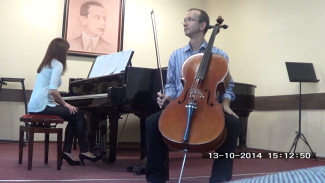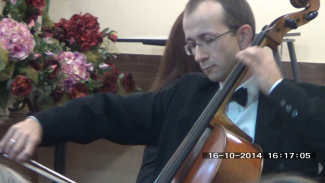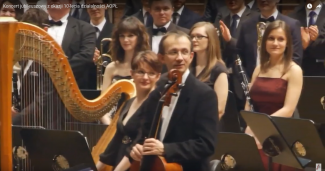He earned his doctoral degree in technical sciences at Gdańsk University of Technology (2010), and habilitated doctorate in engineering sciences in the discipline of technical informatics and telecommunications at Lodz University of Technology (2020). His great passion is music and playing "the most beautiful instrument in the world" - the cello.
You are a unique combination of a musician and a computer scientist. How does it feel to be a musician in the world of computer scientists and especially at a technical university?
It is probably more a question of not how, but who I feel. And I feel I am a computer scientist at least as much as I feel I am a musician, so I can say that I am in the right place, so... it feels good!
But these are indeed two different worlds. I remember the feeling of a certain "surrealism" when, still being a student of Lodz University of Technology, I was studying for my exams and credits in computer science, during breaks in theatre rehearsals or during " slots" between classes in music school... Fortunately, these two worlds were quite close to each other in reality. During my studies at Lodz University of Technology, the Institute of Computer Science was situated in Sterlinga Street, one block away from the Grand Theatre, so I was able to sneak out after the morning lecture to rehearse for a concert or a show, and then come back for the afternoon labs.
Which of these disciplines are you more passionate about? Are you more of a musician or a computer scientist?
I am passionate about both the areas. In retrospect and objectively speaking, however, I think I probably always had a greater predilection for sciences.
They seem to be completely disparate disciplines. Do you find any common elements in them?
Of course, and on many levels. Firstly, the substance of music is sound, which is a physical phenomenon that we model with mathematical tools. And from here it is only a step to computer science. It is worth remembering that research into the basics of harmony, that is, the consonance of sounds, analysis of the length of vibrating strings, etc., was already conducted in ancient Greece by the Pythagoreans. Secondly, the construction of a musical work, with its complexity, multidimensionality, and often great finesse in terms of form, texture, and harmony, requires specific - in some respects extremely exact - predispositions and a certain 'architectural' sense, which is also needed, for example, in the design of algorithms or computer systems. Many consider Bach, for example, to be the greatest "mathematician amongst musicians" of his time. I think, however, that he would probably also have been... an excellent computer scientist, if only he had had the chance to get to know the keyboard of a computer rather than that of a clavichord.
After studying music, you studied mathematics at the University of Łódź for a year. What made you change your interests?
It was hardly a change of interests - mathematics and computer science had always interested me, since the first classes in primary school and the first BASIC programs written on a ZX Spectrum. It was more a matter of a decision I made in the early days of my studies at the University of Music. The decision was based on a rather cool assessment of my potential and perspectives of self-actualisation as a musician.
Even later, when I started my professional career as a teacher in a music school and as an orchestra musician in a theatre, I did not regret this decision. It is true that music is something wonderful, unique. The Grand Theatre in Łódź was always a fascinating, magical place for me, and I could have continued playing, I could have continued teaching cello, but I didn't see it as an opportunity for further development. I wanted to move on, I wanted something more - that was probably the deciding factor.
The need to prove yourself in other, quite different, fields led you, a graduate of the Secondary Music School and the University of Music, to study computer science at Lodz University of Technology?
First I passed the entrance exam to the Faculty of Mathematics at the University of Łódź. However, I had to prepare for it beforehand, which was not so easy considering that my "mathematical background" was non-existent. I'm not talking about aptitude, but about the material which I never studied at school while preparing for the University of Music. I didn't even take the maths exam, and I don't think I took maths at all in secondary school, devoting all my time to practising my instrument for many hours. I can say that in a way I am a self-taught mathematician.
I remember the moment when I stood in front of a pile of books and notebooks borrowed from a friend from a "normal" secondary school - I opened the first notebook and realised that I remembered nothing. I didn't know how to add fractions, how to use shortcut multiplication formulas, absolutely nothing!
But it soon came back, I worked like crazy wanting to catch up on those few years and also learning things completely unknown to me before. The new found mathematics fascinated me. I stayed up late at night poring over those notebooks as if they were some kind of books with secret knowledge, deciphering and absorbing definitions, properties and examples. I remember when I learnt what the derivative of a function was... It was at the castle in Łańcut, where I went to the annual international summer music masterclass. I took part in it once again, but this time in a rather unusual role - that of an interpreter.
I understand that foreign languages are another passion of yours?
You could say that. I know, at varying degrees of proficiency, three: English, German and Italian, not counting a fleeting affair with Russian, French and Spanish. But then I only really knew English. Technically speaking, I took German in high school, but I didn't really start learning it until I finished my first year at the University of Music.
Meanwhile, I had just passed the FCE exam in English, and this - still "warm" - diploma I sent to Łańcut, together with an application to be employed as an interpreter at the music masterclass course. I thought it was a great idea - I didn't have time to practice enough to prepare a programme and go there with my cello as a participant, but go I did, albeit in a different role.
Unfortunately, it turned out that the organisers "went even further", because they invited me by mistake as an interpreter of... the German language! I had a choice to turn around and travel the 400 km back to Łódź, or to try to communicate somehow with the assigned professor from Düsseldorf, who, as it turned out, was a cellist and a nice man who liked unusual challenges just as much as I did.
Eventually, I was accommodated - like the rest of the staff - in one of the castle's rooms, where, in the unique entourage of the baroque Lubomirski and Potocki residence, I spent the nights studying - apart from the basics of differential calculus - the secrets of declination, conjugation and pronunciation of German words.
What did the preparation for the mathematics entrance exams at the University of Łódź look like? For a music school graduate it must have been quite a challenge?
I felt a tremendous fear of confrontation with all those graduates of math-physics classes who were studying in a normal way and for whom many mathematical issues that I was learning for the first time in my life were probably everyday bread. Dr Nowak from the University of Łódź helped me to overcome my complexes - she was an excellent teacher who prepared me for the entrance exam in an absolutely wonderful way.
But I also remember going to that exam with Shostakovich's cello sonata "in my head". It was the second movement of this sonata, a really 'energetic' piece that put me in such a combative mood that nothing could stop me then. I think that if I had been given Fermat's Last Theorem as an exam assignment, I might have tried to prove it by sheer force of momentum.
I studied at the University of Lodz for a year and it was a very good and important time for me. However, at that time I came to the conclusion that one beautiful thing of the "art for art's sake" type (actually: "music for music's sake") I was already doing in my life and that theoretical mathematics is also beautiful, but... one should finally do something more practical.
Which is when you decided to study computer science at Lodz University of Technology?
Yes, I was accepted for the second year with the reservation that I had to complete the first two semesters of physics, which I obviously didn't have at University of Łódź, and that, at the same time, I had to complete the third, current semester. It was very stressful for me, because my level of physics after secondary music school was unfortunately similar to that of mathematics.
I finally conquered physics, largely thanks to the support and kindness of Dr. Górski from the Institute of Physics at Lodz University of Technology, whose understanding of my musical roots became clear to me when, a few years later, I had to work with his daughter - a pianist. It turned out that she, who later became Deputy Dean of the Faculty of Vocal and Acting Performance at the University of Music, came to my cello class, which I ran at the Aleksander Tansman Primary Music School, as an accompanist... And this is - coming back to the first question - another example of this closeness and overlap of various "worlds".
While studying at Lodz University of Technology you gave concerts, among others, in the Grand Theatre in Lodz. Do you still perform
Now I perform sporadically. I do not have much time for such pleasures, and every performance requires preparation and participation in rehearsals. The last major concert I took part in was the 10th anniversary of the Łódź University of Technology Academic Orchestra at the Łódź Philharmonic. For me it was a kind of return to the roots, as maestro Ryszard Osmoliński, the conductor in charge of the orchestra from the very beginning, was behind the conductor's desk. He is a great artist and an excellent educator, with whom I had the pleasure to play many times, when I was still in high school, as a member of the Łódzkie Smyczki ensemble.
You have travelled a lot with the orchestra of the Grand Theatre in Lodz. What was your most important performance? Which concert do you remember in particular?
Indeed, when I started working in the Grand Theatre, it was a period of quite intensive foreign tours. We played many times in Germany, Switzerland, Holland... but the greatest experiences and emotions were probably in Łódź. This is where I discovered to myself the most beautiful sheets of opera music - Puccini's Madame Butterfly and Tosca, Mascagni's Cavalleria rusticana, Leoncavallo's Pagliacci...
There were many more memorable titles, but I think that the greatest emotions accompanied the performances with a small ensemble, with a single cast and on stage. It should be remembered that an orchestra in the theatre usually sits in the orchestra pit; the mere appearance of a "pit musician" on stage is a kind of event.
An interesting project was e.g. Cimarosa's Impresario in distress, in which a chamber orchestra, together with singers and audience, was placed on a huge float riding on the stage of the Grand Theatre. I will also never forget Villa-Lobos' suite Bachianas Brasileiras for soprano and an ensemble consisting only of cellos. It was one of my first performances at the Grand Theater and at the same time a great responsibility. We accompanied Joanna Woś, whose extraordinary coloratura soprano I later had the opportunity to admire more than once in the works of Verdi, Puccini, Donizetti that we performed...
In your research work at Lodz University of Technology you focus, among other things, on developing software for the analysis and processing of acoustic signals. This seems to be a perfect combination for your two interests?
You could say so... and, in fact, this is the direction I am consistently striving towards. One of the associate professors at the University of Łódź, with whom I used to work in mathematical analysis, upon hearing about my musical and mathematical adventures, said: "You know what, ... you are really divergent!". It stung me somehow and since then I have been trying to look for all possible "areas of convergence" in what I do.
Computer science has many important applications not only in the field of audio signal processing itself (just to mention lossy and lossless audio compression algorithms, or methods of sound synthesis and filtering), but also in the "high-level" analysis of music recordings. It can be said that thanks to the possibilities given by modern methods of artificial intelligence and machine learning, a computer can "hear" in these recordings the same qualities as a human being.
Have you managed to infect anyone close to you with your passion for music?
I try to "infect" all the time - I can say that I am permanently "positive" in this respect! I especially encourage parents of pre-schoolers to send their children to music school or to sign them up for Suzuki instrument lessons.
I am involved in projects connected with my children's music education - for example, I take an active part in summer music courses organised by a well-known Lodz educator, Andrzej Klemba, for the youngest violinists learning the Suzuki method.
Last year's course was unfortunately cancelled due to the pandemic, but in its place we produced a 'virtual concert' assembled from individual parts recorded at home by participants and their parents, with a guest appearance by the eminent Polish jazz violinist Maciej Strzelczyk.
Why is it good to have a passion in life?
It’s worth having an alternative, a break from everyday life. Such a "crop rotation" simply does good. And music gives me strength to live, stimulates me, is better than coffee and all other stimulants...
Interview by Małgorzata Trocha



